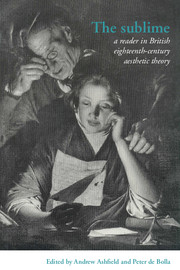Book contents
- Frontmatter
- Contents
- List of Abbreviations
- Introduction
- Part I The Longinian tradition
- Part II Rhapsody to rhetoric
- 11 The spectator, (1712-1714)
- 12 A discourse on ancient and modern learning (1734)
- 13 Characteristicks (1714)
- 14 The works (1724)
- 15 To David Fordyce, 18th June 1742
- 16 The pleasures of imagination (1744)
- 17 An essay on the sublime (1747)
- 18 Observations on man (1749)
- 19 Lectures on the sacred poetry of the Hebrews (1753/1787)
- 20 A dictionary of the English language (1755)
- 21 Conjectures on original composition (1759)
- 22 The art of speaking (1761)
- 23 A course of lectures on oratory and criticism (1777)
- 24 An enquiry concerning the principles of taste (1785)
- Part III Irish Perspectives
- Part IV The Aberdonian Enlightenment
- Part V Edinburgh and Glasgow
- Part VI From the Picturesque to the Political
- Sources and further reading
14 - The works (1724)
Published online by Cambridge University Press: 05 June 2012
- Frontmatter
- Contents
- List of Abbreviations
- Introduction
- Part I The Longinian tradition
- Part II Rhapsody to rhetoric
- 11 The spectator, (1712-1714)
- 12 A discourse on ancient and modern learning (1734)
- 13 Characteristicks (1714)
- 14 The works (1724)
- 15 To David Fordyce, 18th June 1742
- 16 The pleasures of imagination (1744)
- 17 An essay on the sublime (1747)
- 18 Observations on man (1749)
- 19 Lectures on the sacred poetry of the Hebrews (1753/1787)
- 20 A dictionary of the English language (1755)
- 21 Conjectures on original composition (1759)
- 22 The art of speaking (1761)
- 23 A course of lectures on oratory and criticism (1777)
- 24 An enquiry concerning the principles of taste (1785)
- Part III Irish Perspectives
- Part IV The Aberdonian Enlightenment
- Part V Edinburgh and Glasgow
- Part VI From the Picturesque to the Political
- Sources and further reading
Summary
On the excellency of divine contemplation
The mind of man is naturally delighted with the contemplation of whatever is beautiful and excellent; and the greater and more sublime those perfections are, wherewith any object is endued, the more exalted and refined is the pleasure, which the soul conceives from the contemplation of it. Now God is a being of infinite perfection and excellence, in whom all the rays of goodness and beauty which are scattered and dispersed among the creatures, concentre and are united. It cannot therefore be imagined, but that the contemplation of so lovely and excellent an object must be highly grateful and pleasing to the soul. That infinity of the divine attributes and perfections, which by puzzling and embarrassing the understanding, might be thought to lessen this pleasure, does really increase it. For the mind is naturally pleased with the speculation of what is infinite, and loves to lose itself, as it were, in an unfathomable depth.
The grandeur and magnificence of an infinite object affect it with an ineffable complacency; somewhat like that we take in beholding the vast expanse of the firmament, or the spacious surface of the ocean. Thus we find that those theorems in geometry, which have a relation to infinity, afford the greatest delight and satisfaction to curious minds: such, for example, as that of Torricellius, that a solid of infinite length, may be equal to a finite quantity: or those wonderful theorems about the proportions of infinite quantities, which Dr Halley has published in the Philosophical Transactions.
- Type
- Chapter
- Information
- The SublimeA Reader in British Eighteenth-Century Aesthetic Theory, pp. 80 - 83Publisher: Cambridge University PressPrint publication year: 1996



